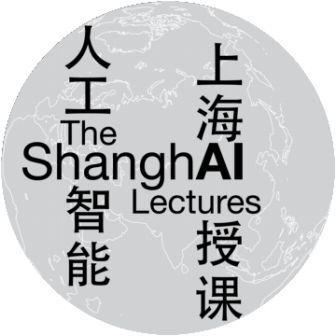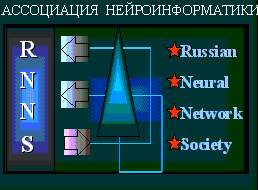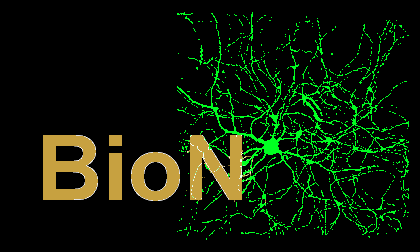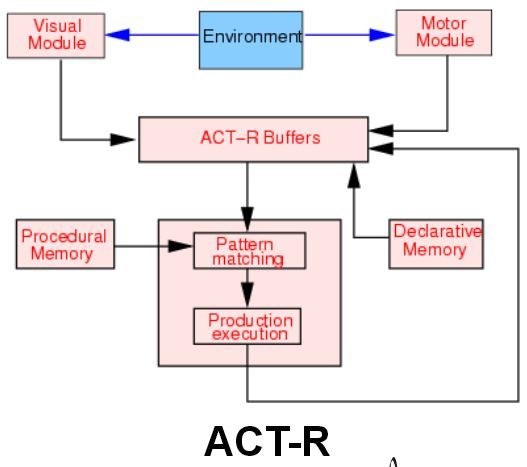 Оглавление
Оглавление- Курс "Шанхайские ЛекцИИ"
- Лекции по нейроинформатике
- "Мозг" - Междисциплинарный семинар
- "BioN" - Национальная Сеть Аспирантур по Биотехнологиям в Нейронауках
- AGI Summer School
- Нейрошкола (ОНПУ)
- ACT-R Workshops & Summer Schools
- Annual SOAR Workshops
- Related Link
Введение
В этом разделе размещены ссылки на образовательные ресурсы сети Интернет (лекции, семинары, школы), связанные с исследованиями в предметной области "Интеллектуальные системы и искусственный интеллект" и доступные дистанционно для ознакомления.
Список составлен по результатам поиска в сети Интернет, в общедоступных базах данных и других информационных источниках. Составители не несут ответственности за точность представленной информации. Порядок размещения информации в списке выбран составителями.
Список ссылок непрерывно пополняется. Просьба присылать любые предложения, дополнения, изменения, уточнения представленной информации по адресу E-mail: Этот адрес электронной почты защищён от спам-ботов. У вас должен быть включен JavaScript для просмотра..
Зарегистрированные авторы и редакторы разделов имеют прямой доступ к редактированию информации по соответствующему разделу.
1. Курс "Шанхайские ЛекцИИ " (the ShanghAI Lectures)
" (the ShanghAI Lectures)
"Шанхайские ЛекцИИ" - это проект Цюрихского университета (Швейцария), представляющий собой серию лекций об Искусственном Интеллекте на английском языке.
Сайт проекта – shanghailectures.org
Курс «Шанхайские лекцИИ» изначально разрабатывался для Шанхайского университета Джао Тонг, Китай (Shanghai Jiao Tong University, China) и впервые был прочитан там - откуда и получил свое название. Две заглавные буквы "ИИ" означают "искусственный интеллект" (в оригинале "ShanghAI Lectures" - Artificial Intelligence).
Стартовал проект в 2009 г. и проводится ежегодно осенью. Автором проекта является профессор Рольф Пфайфер, читавший лекции в 2004-2011 гг. в ряде университетов Японии и Китая.
He was elected the 21st Century COE Professor of Information Science and Technology at the University of Tokyo, Japan, for 2003/2004, from where he held the first global, fully interactive, videoconferencing-based lecture series “The AI Lectures from Tokyo” (материалы этого предшествующего курса 2003-2004 года также доступны).
Предмет лекций курса – интеллект, естественный и искусственный, с фокусом на идее “Embodied Intelligence”.
Список тем, которым были посвящены лекции:
• Как изучать интеллект?
• Естественный vs. искусственный интеллект
• Классические подходы к когнитивной науке и их проблемы
• Теоретические основания идеи воплощения
• Принципы построения интеллектуальных систем в различных временных шкалах
• Обучение и развитие, искусственная эволюция и морфогенез
• Принципы коллективного интеллекта
• Модульная робототехника
• Приложение принципов к повсеместному вычислению, бизнесу, человеческой памяти и роботам в каждодневной жизни
Лекции транслируются из Лаборатории искусственного интеллекта (Artificial Intelligence Laboratory) Цюрихского университета (Department of Informatics, University of Zurich, Zurich, Switzerland) и проводятся в формате видео-конференций. Помимо просмотра лекций участники вовлекаются в живые дискуссии и выполнение упражнений в трехмерном виртуальном совместном пространстве.
Читал основные лекции из Швейцарии заведующий Лабораторией искусственного интеллекта проф. Рольф Пфайфер (Director Rolf Pfeifer, Ph.D. in computer science).
В программе курса предусмотрены также лекции приглашенных докладчиков и выступления студентов-участников, самостоятельные работы.
В проекте ежегодно принимают участие университеты различных стран, в том числе Китая, Японии, Швейцарии, Германии, Саудовской Аравии, ОАЭ, Англии, Австралии, Испании. Россию представлял Научно-образовательный центр когнитивных программ и технологий (НОЦ КПиТ РГГУ) (о курсе "Шанхайские ЛекцИИ 2010" и "Шанхайские ЛекцИИ 2011" можно прочитать в разделе "Завершенные проекты").
В проекте могут принять участие студенты старших курсов бакалавриата или специалитета, студенты магистратуры и аспиранты по следующим дисциплинам: интеллектульные системы, компьютерные науки, психология, лингвистика, философия. Для участия в лекциях не требуется специальная техническая подготовка, но наличие базовых навыков работы с компьютером приветствуется. Обязательное требование – свободное владение английским языком.
По окончании курса студентам выдаются сертификаты с последующим внесением в приложение к диплому. Для аспирантов курс может быть засчитан как практикум.
Материалы прошедших курсов доступны всем для ознакомления:
• 2012 год
- 10 основных лекций
- Лекции приглашенных докладчиков
Доступ к архивам лекций предыдущих лет:
2003-2004 (Tokio) | 2009 | 2010 | 2010 Final Report | 2011
Будущее лекций - The Future of the ShanghAI Lectures
"We are currently think about the continuation of the ShanghAI Lectures project:
• in which direction should we go?
• Continuation of what we are currently doing?
• Inclusion of more virtual or mixed-reality environments?
• Other presence technologies?
• Transfer to different subject areas?
• Closer collaboration between groups?
• More sharing of teaching between lecturers world-wide? etc. etc. Ideas are warmly welcome."
= = Из блога Рольфа Пфайфера (Rolf Pfeifer's Blog) = =
Объявление: ShanghAI Lectures 2013
• Guest Lectures (Список и материалы лекций: видеотрансляции, слайды, файлы)
Среди лекторов, например:
Lecturer: Kevin Warwick, Cybernetics Research Group, The University of Reading, UK), профессор, один из ведущих специалистов по кибернетике, пионер киборгизации, который ведет работы по обновлению тела человека и начал он с самого себя - 14 марта 2002 года в его левую руку была имплантирована матрица из 100 электродов, подключенных к нервным волокнам, и через этот интерфейс он может управлять другой, искусственной рукой и другими устройствами, проводить эксперименты по двунаправленному прохождению сигналов в мозг и обратно (смотри его проекты Cyborg 1.0, Cyborg 2.0 и книгу Kevin Warwick, "I, Cyborg").
Лекция: AI with biological brains
Дополнительная информация:
• Rolf Pfeifer - Wikipedia
• Rolf Pfeifer's homepage at the Artificial Intelligence Laboratory, Department of Informatics, University of Zurich
• Tutorial on Embodiment The title of this tutorial doesn't do justice to the breadth of its coverage of cognition and cognitive systems. It actually provides a wide-ranging summary of the main aspects of this discipline, from cognitivist AI right through to embodied emergent cognition.
It's edited by Matej Hoffmann, Dorit Assaf, and Rolf Pfeifer at the Artificial Intelligence Laboratory, Department of Informatics, University of Zurich, Swiss
Руководство с сайта http://www.eucognition.org/
2. Лекции по нейроинформатике
2.1. Лекции по нейроинформатике на сайте Российской ассоциации нейроинформатики
Материалы лекций по нейроинформатике, прочитанных на заседаниях школ-семинаров по нейроинформатике, проводимых Российской ассоциацией нейроинформатики во время конференций по нейроинформатике, проходящих в рамках Научной сессии МИФИ, начиная с 1999 года, и другие материалы (семинаров, круглых столов).
· Лекции по нейроинформатике 2008 | 2007 | 2006 | 2005 | 2004 | 2003 | 2002 | 2001
· Материалы круглого стола "Дискуссия о нейрокомпьютерах - 10 лет спустя" (1999 г.)
2.2. Эти же и дополнительные материалы представлены на сайте: neurolectures.narod.ru
· Лекции по нейроинформатике 2010 | 2009
· Лекции по нейроинформатике 2008 | 2007 | 2006 | 2005 | 2004 | 2003 | 2002 | 2001
· Материалы круглого стола "Дискуссия о нейрокомпьютерах - 10 лет спустя" (1999 г.)
2.3. Лекции по нейроинформатике и другие материалы на сайте С.А. Терехова (1994-2012)
(Лаборатория Искусственных Нейронных Сетей НТО-2, ВНИИТФ, Снежинск)
Терехов, Сергей Александрович: Сайт Нейронные сети и их приложения (alife.narod.ru)
В том числе:
· Лекции по теории и приложениям искусственных нейронных сетей (Снежинск, 1994-1998)
· Вейвлеты и нейронные сети. Лекция для школы-семинара "Современные проблемы нейроинформатики" (Москва, МИФИ, 24-26 января 2001 года)
· Типовые задачи для информационного моделирования с использованием нейронных сетей (Снежинск, декабрь 2000 г.)
2.4. Лекции по нейроинформатике - 2014 (pdf) по материалам школы-семинара
"Современные проблемы нейроинформатики" в рамках Научной сессии НИЯУ МИФИ-2014
ISBN 978-5-7262-1897-7
Новое. Смотри материалы на странице
Нейроинформатика - Конференции (Научные сессии МИФИ) .
3. "Мозг" - Междисциплинарный семинар
Руководитель семинара - Анохин К.В., профессор, член-корреспондент Российской академии медицинских наук,
заведующий Отделом нейронаук НБИК-Центра НИЦ "Курчатовский институт",
заведующий Отделом системогенеза Института нормальной физиологии им. П.К. Анохина
Сайт: http://neurogene.ru/

Человеческий мозг, состоящий из более чем 100 миллиардов нейронов, — самый сложный объект в известной нам Вселенной. Его изучение связано с поисками ответов на наиболее глубокие вопросы о человеческой природе. Как мы произошли и что мы наследуем от наших предков? Как наше поведение зависит от наших генов? Как мы познаем мир и как мы изменяемся в процессе этого познания? Как мы чувствуем, желаем и мыслим? Как наш разум связан с нашим мозгом, нервными клетками и их молекулами?
Сегодня науки о мозге объединяют нейрофизиологов и нейроанатомов, молекулярных генетиков и эмбриологов, этологов и эволюционных биологов, психологов и психиатров, математиков и специалистов в области компьютерных наук и искусственного интеллекта.
Цель семинара – поиски новых разных путей взаимодействия этих дисциплин в изучении мозга и поведения.
Некоторые рубрики:
- Строение и функции мозга
- Исследования мозга
- Опыты и эксперименты
- Нейроэволюция
- Спорные моменты и проблемы
- Новости
- Архив семинаров
4. "BioN" - Национальная Сеть Аспирантур по Биотехнологиям в Нейронауках
Сайт: http://www.neurobiotech.ru/ru/main Российская Школа постдипломного образования в области нейронаук
Российская Школа постдипломного образования в области нейронаук
Программа последипломного обучения в области нейробиологии (Биотехнологии в Нейронауках - "БиоН") создана на базе аспирантур ведущих университетов России - Московский Государственный Университет, Санкт-Петербургский Государственный Университет, Университет Нижнего Новгорода, Южный Федеральный Университет совместно с Интститутами РАН (Физико-технический институт (ЛФТИ), Санкт-Петербург; Физико-технический центр исследований и образования и др.).
БиоН - координированная сеть ведущих научных и технологических центров России в различных областях нейронаук, связывающая университеты, исследовательские институты и высокотехнологичное производство.
БиоН ставит своей целью разработать систему для обмена опытом в различных областях биотехнологии и нейробиологии между научными и образовательными центрами, содействовать мобильности студентов и преподавателей, для обеспечения передачи информации между наукой, производством и образованием.
БиоН осуществляет национальное и международное сотрудничество, обеспечивает мобильность студентов и преподавателей.
О Проекте
Образовательный центр по нейротехнологиям:
- Семинар "НейроТехнологии"
- Школы БиоН
- Лекционные курсы
- Лаборатории БиоН
Некоторые материалы прошедших семинаров, школ, лекций доступны для ознакомления.
5. AGI Summer School
Artificial General Intelligence (AGI) is a research field where the goal is to build computer systems with general intelligence. Comparing with conventional Artificial Intelligence (AI) research, AGI treats intelligence as a unity of cognitive functions that can be applied to different domains, rather than focusing on domain-specific and problem-specific solutions.
In recent years, the AGI community has developed significantly. Now there are
AGI conferences (http://www.agi-conf.org),
Journal of AGI (http://www.versita.com/jagi), and
other publications, dedicated to AGI research.
Even so, currently few institution provides proper educational program for students interested in AGI research.
Site of AGI Summer School
2009 The 1st International Summer School on Artificial General Intelligence, June 22 – July 3, 2009, Artificial Brain Laboratory, Xiamen University, Xiamen, China
http://agi-school.org/category/2009
2009 AGI Summer School Artificial General Intelligence
2009 Lectures - 2009 AGI Summer School
Each session is 1.5 hours. Each lecture is 1 session unless otherwise specified.
List of Lecture Topics and Background Readings
Many lectures specify readings along with them. Some readings are explicitly specified as optional, mostly not because they’re peripheral but just because they’re long. The readings list given here is very partial and will be completed as the Summer School approaches.
Dr. Ben Goertzel – AGI versus Narrow AI
This was the opening lecture of the First AGI Summer School. A nontechnical lecture, giving a review of the history of the AI field, and the foundational theory of intelligence, culminating in a clarification of the distinction between Artificial General Intelligence and task-focused “narrow AI.”
Also a brief overview of some current software systems aimed at AGI, including OpenCog, NARS and others.
The slides for the talk are here in PPT format and here in PDF format.
Dr. Ben Goertzel – The Mathematics of Universal and General Intelligence
This lecture briefly reviews universal machine learning theories, including Solomonoff’s Algorithimic Probability Theory, Hutter’s AIXI algorithm and Schmidhuber’s Goedel Machine. Relevance of these theories to pragmatic general intelligence is also covered.
Readings
- Universal AI: (optional)
- Godel Machine:l (optional)
You can download the entire video here
Dr. Pei Wang – A Logical Model of Intelligence 1 of 3
Dr. Pei Wang – A Logical Model of Intelligence 2 of 3
Dr. Pei Wang – A Logical Model of Intelligence 3 of 3
NARS (Non-Axiomatic Reasoning System) is designed to serve as the core of general-purpose intelligent systems. It is built according to the belief that “intelligence” is the capability for a system to adapt to its environment while working with insufficient knowledge and resources. This four-day talk will introduce the major components of NARS, and discuss their properties.
Readings
- Toward a Unified Artificial Intelligence, http://nars.wang.googlepages.com/wang.unifiedAI.pdf
- From NARS to a Thinking Machine, http://nars.wang.googlepages.com/wang.roadmap.pdf.
You can download the entire video here
Dr. Pei Wang – Approaches to Defining and Evaluating General Intelligence
This one-day talk will introduce the major approaches in building general-purpose AI systems, compare them with human intelligence, analyze their theoretical assumptions, and evaluate their potential and limitation.
Readings
What Do You Mean by “AI”?, http://sites.google.com/site/narswang/publications/wang.AI_Definitions.pdf
Artificial General Intelligence: A Gentle Introduction, http://sites.google.com/site/narswang/home/agi-introduction
Dr. Joscha Bach – The MicroPsi Architecture (You can download the entire video here)
Dr. Joscha Bach – Understanding Motivation, Emotion and Mental Representation (You can download the entire video here)
Dr. Joscha Bach – Man as Machine (You can download the entire video here)
Dr. Joel Pitt with Dr. Ben Goertzel – OpenCog Software Framework 1 of 2
Dr. Joel Pitt with Dr. Ben Goertzel – OpenCog Software Framework
Dr. Joel Pitt – Probabilistic Logical Networks in OpenCog (You can download the entire video here)
OpenCog aims to provide research scientists and software developers with a common platform to build and share artificial intelligence programs. The long-term goal of OpenCog is acceleration of the development of beneficial AGI, a goal which includes developing tools and protocols for AGI safety. This lecture will describe the OpenCog software framework from a theoretical perspective, and also provide hands-on guidance to working with the code.
Readings
- Hart, David and Ben Goertzel (2008). OpenCog: A Software Framework for Integrative AGI, Proceedings of the First Conference on AGI
- OpenCog wiki site, http://opencog.org (obviously students need not read the whole wiki) You can download the entire video here
2011 Constructivist A.I. Workshop, September 2011, Reykjavik University, Reykjavik, Iceland
Lectures from the Constructivist A.I. Workshop 2011 (Video-Lectures recorded in August 2011, Reykjavik, Iceland) Constructivist A.I. Workshop 2011
- Kristinn R. Thórisson: "From Constructionist to Constructivist A.I.: Architecture Matters"
The Task – To build intelligent systems that work in the real world.
They should be able to:
- learn a host of vastly different tasks
- adapt to vastly new circumstances
- actively acquire new knowledge for the above, as needed
- Eric Nivel: "Requirements For Artificial General Intelligence"
- Jörg Siekmann: "Automated Reasoning"
- Ricardo Sanz: "Predictable Constructivism"
- The Constructivist Project: "TheConstructivistProject"
- Nate Derbinsky: "The Soar Cognitive Architecture: Towards Human-Level Intelligence"
2012 The 2nd International Summer School on Artificial General Intelligence, August 1–15,2012, Reykjavik University and the Icelandic Institute for Intelligent Machines (IIIM), Reykjavik, Iceland
This summer school focuses on issues related to the original goal of artificial general intelligence, namely that of building machines capable of operating in a range of different environments and domains, and doing a range of unrelated tasks in a coordinated manner, with a special focus on architectural and integrative issues. What some have called “general AI”.
Fundamental AI challenges are presented and dissected, including:
What kinds of methodologies will be required to achieve artificial general intelligence (AGI)?
How different will they be from today's software development methods?
What role can logic and reasoning play?
How do we construct highly distributed architectures for these purposes?
Do we need new programming languages?
Starting with the limitations of present software development methodologies based on hand-coded knowledge, we outline new methodologies involving self-organizing and self-programming systems - what we call constructivist AI - and present recent advances in reasoning-based and self-expanding architectures.
Hands-on work will include experiments in the newly-developed programming language Replicode, which has been explicitly created for AI systems capable of self-inspection.
Background
Since the introduction of powered factories in the 1800's, the use of machines for automation of routine tasks has become a staple of modernity. With the arrival of practical computing in the mid-1900's, automating routine information processing has seemed an obvious step in the same direction. But could that same paradigm be used to automate non-routine tasks as well? Could computing power be used to solve problems and tasks that required more than a narrow knowledge of a sequence of steps – tasks that we might say require insight, creativity, invention? This question has stirred a hot debate from the early days of what is now typically referred to by the term “artificial intelligence” (“artificial” because it is hand-made, “intelligence” because it requires more than blind execution of a series of simple steps).
With the advent of ever-more powerful search engines, classification algorithms and machine vision applications, the line between “dumb automation” and “intelligent behavior” is more blurry than ever. It may seem that with current trends continuing we should eventually see machines have the power of a human mind. However, a growing criticism of the present practices in the field of A.I. Is that the research practices choose too narrow a focus, instead of targeting the core question that started the field, namely, Can we make machines that have *general* intelligence, in the sense that most people understand the term? No matter how the A.I. challenge is addressed, one thing is clear: human-level intelligence calls for a complex system. Are the current software development methods in popular use up to this task? Arguments are accumulating that new methodologies are needed to lead us to machines that rival the human mind. Chief among the functions that are difficult to address with present software design methods are transversal cognitive functions: functions of thought that seem highly flexible and able to operate for a wide range of human skills, such as general learning abilities, attentional control, and explanatory and introspective abilities.
Organization
The summer school is organized around three key threads. The first, and main one, relates to constructionist versus constructivist AI methodologies, self-programming, introspection and logic. The second is the theoretical foundation of AI, the difference between cognitive science and AI, and the basic principles on which AI currently stands. The third and last is the role of AI in society, current academic and industrial methods used to advance it, and societal changes that may be expected from its development in the next 20 years.
Schedule Day-by-Day
READINGS
Go to the Readings Page
Complete Readings
Invited Lectures
List of Attendees
Lecture Slides
AGI Debates & Student Workshops
AGI SummerSchoool on Facebook
2013 The 3rd International Summer School on Artificial General Intelligence, July 17-30, 2013, the Department of Intelligence Science of Peking University, Beijing, China
(before and collocate with the Sixth Conference on Artificial General Intelligence (http://www.agi-conf.org/2013/))
Final Schedule |
The two-week school consists of three short courses, each of which introduces a representative AGI project, as well as discusses some general issues in AGI research. The main instructors and their systems are:
- Pei Wang (http://www.cis.temple.edu/~pwang/, Temple University, USA), NARS
- Kristinn R. Thórisson (http://www.ru.is/faculty/thorisson/, Reykjavik University, Iceland), AERA
- Ben Goertzel (http://wp.goertzel.org/, Novamente LLC, USA), OpenCog
The teaching language is English. There is no tuition fee for attending the school, and the students only need to cover their own travel and living expenses. For hotel information, see http://www.agi-conference.org/2013/logistics/.
The school will accept at most 50 students from applicants all over the world. Applications are accepted until all the seats are taken. To apply, email an application letter to Этот адрес электронной почты защищён от спам-ботов. У вас должен быть включен JavaScript для просмотра. to describe the related educational and research background of the applicant. There is no special application form to fill, and the application can have attachments (CV, papers, etc.), though they are not required.
6. Нейрошкола (ОНПУ - Украина)
Сайт neuroschool.narod.ru создан в образовательных целях для обмена знаниями, опытом и достижениями в области нейронных сетей и нейрокомпьютинга (в последнее время по-видимому нет обновлений).
Авторы сайта - сотрудники Одесского Национального Политехнического Университета (ОНПУ), Украина:
Крисилов Виктор Анатольевич, доктор технических наук, заведующий кафедрой Системного Программного Обеспечения факультета автоматики и вычислительной техники Одесского Нацоинального Политехнического Университета.
Тарасенко Руслан Алексеевич, бывший сотрудник ОНПУ
Кондратюк Александр Васильевич, сотрудник ОНПУ
E-mail: Этот адрес электронной почты защищён от спам-ботов. У вас должен быть включен JavaScript для просмотра., Этот адрес электронной почты защищён от спам-ботов. У вас должен быть включен JavaScript для просмотра.
Чумичкин Константин Васильевич, создатель сайта, автор некоторых статей, сотрудник ОНПУ.
E-mail: Этот адрес электронной почты защищён от спам-ботов. У вас должен быть включен JavaScript для просмотра.
Материалы Нейрошколы: СТАТЬИ
Основные моменты и положения теории нейросетей
Нейроинформатика: общие вопросы, пути развития...
Нейронные сети - теория, обучение, архитектуры
Нейросетевое прогнозирование временных рядов
Приложения нейронных сетей в различных областях
О ПРОЕКТЕ | КНИГИ | Работы сотрудников ОНПУ по нейронным сетям | ССЫЛКИ
7. ACT-R Workshops & Summer Schools

Когнитивная архитектура ACT-R разрабатывается под руководством Джона Р. Андерсона и Кристиана Лебье (Christian Lebiere) Исследовательской группой по проекту (ACT-R Research Group) департамента психологии (Department of Psychology) университета Карнеги-Меллона (Carnegie Mellon University), Питтсбург, штат Пенсильвания, США при участии международной команды исследователей из лабораторий университетов и компаний Северной и Южной Америки, Европы, Азии и Австралии.
Разработчики когнитивных архитектур семейства ACT-R уже более 30 лет (с 1994 года) ежегодно проводят Семинар и летнюю школу ACT-R для исследователей и студентов. На семинаре ведущие исследователи сообщают о последних версиях разработанного программного обеспечения и обсуждают результаты своей работы.
Материалы прошедших семинаров и школ (доклады, лекции, презентации, практические занятия и руководства, ссылки на необходимые ресурсы) доступны всем, полные сведения представлены на странице нашего портала: Когнитивная архитектура ACT-R.
8. Annual SOAR Workshops

Когнитивные архитектуры семейства SOAR разрабатываются с начала 1980-х годов интернациональной исследовательской группой по проекту, сначала под руководством Аллена Ньюэлла (Allen Newell) (19 марта 1927 – 19 июля 1992) в Университете Карнеги-Меллона (Carnegie Mellon University), Питтсбург, Пенсильвания, США, затем Джона Лэйрда (John Laird) в Лаборатории искусственного интеллекта (Artificial Intelligence Laboratory) Университета штата Мичиган (University of Michigan), г. Энн-Арбор, Мичиган, США.
Члены сообщества разработчиков когнитивных архитектур семейства SOAR ежегодно проводят Семинар SOAR для исследователей, аспирантов и студентов. На семинаре ведущие исследователи встречаются лично и сообщают о последних версиях разработанного программного обеспечения, обсуждают результаты своей работы и планы на будущее.
Материалы прошедших семинаров (доклады, лекции, презентации, дистрибутивы, руководства, инструментальные средства и др.) доступны на странице нашего портала: Когнитивная архитектура SOAR.




